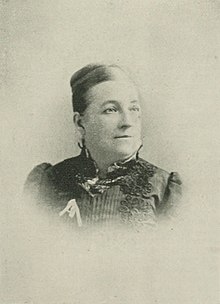Eliza Trask Hill | |
|---|---|
 | |
| Born | Eliza Sessions Carpenter Trask May 10, 1840 Warren, Massachusetts, U.S. |
| Died | March 29, 1908 (aged 67) Somerville, Massachusetts, U.S. |
| Resting place | Laurel Hill Cemetery, Fitchburg, Massachusetts, U.S. |
| Occupation | activist, journalist, philanthropist |
| Language | English |
| Genre | newspaper |
| Spouse |
John Lange Hill (m. 1867) |
| Children | 3 |
| Relatives | Francis Cooke |
Eliza Trask Hill (née, Trask; May 10, 1840 – March 29, 1908) was an American activist, journalist, and philanthropist of the long nineteenth century.[1][2] During the Civil War, Hill obtained, by subscription, and presented a flag to the Fifteenth Massachusetts Regiment. Her presentation speech was so patriotic that it produced a marked effect and was widely quoted. For ten years, she was a teacher. At the age of 26, she married John Lange Hill; they had two sons and a daughter.
Hill was one of the first to join the Woman's Christian Temperance Union (WCTU), and has served in an official capacity in that body from its beginning, becoming connected with the prison and jail department. She labored for the redemption of abandoned women, but, believing that preventive is more effectual than reformatory work, she identified herself with the societies that cared for and helped working women. From 1879, when the right of school suffrage was grunted to the women of Massachusetts, she was actively engaged in politics, having worked for the Prohibition Party. Her services as an advocate of the Australian ballot system were in great demand. During the public school agitation in Boston in 1888, when 20,000 women rescued the public schools from mismanagement, Hill was among the leaders of the movement, making plans for the campaign, helping to rally the women, and by her addresses, arousing both men and women. For several years, she served as the president of the ward and city committee of Protestant Independent Women Voters, a recognized political organization, and anti-Catholic in its campaigning.[3] When the need of a party organ was felt, Hill, unaided at first, began the publication, in Boston, of a weekly newspaper, which later was cared for by a stock company of women. Hill was editor of the paper, which was called the Woman's Voice and Public School Champion.[4] Hill was active in the woman's suffrage movement.
- ^ Foster & Woods 1908, p. 314.
- ^ Willard & Livermore 1893, p. 379.
- ^ Hartley 2011, p. 78.
- ^ Willard & Livermore 1893, p. 380.